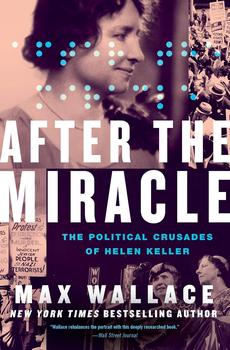Summary | Excerpt | Reviews | Beyond the Book | Readalikes | Genres & Themes | Author Bio

The Political Crusades of Helen Keller
by Max Wallace
Laura Dewey Bridgman was born in Hanover, New Hampshire, on December 21, 1829— the third child of farmer Daniel Bridgman and his wife, Harmony. Laura had been prone to seizures as an infant and her parents feared she would not survive. But by the age of twenty months, she appeared to regain her health and proved to be a lively, intelligent child. She was already beginning to speak in short sentences when, at the age of twenty-four months, scarlet fever ripped through the household. Both her sisters died, and Laura also nearly succumbed to the ailment, which infected countless children before the development of antibiotics made it a manageable illness. By the time the fever dissipated, the inflammation had taken a terrible toll. Laura lost her sight, hearing, and sense of smell. Her eyes were so sensitive to light that she had to be kept in a darkened room for five months.
After Howe read an account about Laura written by the head of the Dartmouth College medical department, he immediately arranged to visit Hanover with a group of friends to seize the "rare opportunity" to determine whether this was the prospective pupil he had been searching for. Among the party that accompanied him on the outing was Henry Wadsworth Longfellow, who at the time was a young Harvard professor of modern languages but who would soon emerge as one of America's best-known poets. Upon meeting Laura, Howe knew his search was over. "I found her with a well-formed figure; a strongly marked, nervous sanguine temperament; a large, beautifully shaped head; and the whole system in healthy action," he later recalled.
Three months later, in October 1837, the seven-year-old girl arrived at Perkins to begin her education. Laura was at first "much bewildered" by her strange new surroundings until she became acquainted with her fellow "inmates," as Howe described his students. Once she settled down, he began his experiment in earnest, using everyday objects such as a spoon, a fork, and a key, and pasted labels with their name embossed in raised letters. Before long, she learned to place the labels on the correct objects, but Howe sensed that these skills merely demonstrated an aptitude for "imitation and memory" rather than an integration of language.
After weeks had passed, he resolved to try a new approach. Rather than simply assigning a label to an object, he cut it into separate components to introduce the concept of letters. Cutting up the word "book" into four pieces, he placed them in the correct order while guiding Laura's hand to a book. He then scrambled the letters and let her try to piece them together as if to let her solve the next step in the strange puzzle. When this proved successful, he did the same with the word "key."
Describing her progress, Howe would later describe this breakthrough as the "supreme moment" when Laura grasped the idea that his efforts and that of the other teachers who had worked with her for weeks had established communication between "her thoughts and ours":
Hitherto, the process had been mechanical ... The poor child had sat in mute amazement, and patiently imitated everything her teacher did; but now the truth began to flash upon her, her intellect began to work, she perceived that here was a way by which she could herself make up a sign of anything that was in her own mind and show it to another mind ... I could almost fix upon the moment when this truth dawned upon her mind and spread its beams upon her countenance. I saw that the great obstacle was overcome.
Laura's biographer Ernest Freeberg would note that Howe's description of this eureka moment was missing from his earliest accounts of her progress and didn't appear until his annual report of 1841, three years later. Nevertheless, it was evident that Laura had acquired the basic principles of language. Once she learned the twenty-six letters of the alphabet, she quickly mastered the concept of forming the letters into words. From the moment she understood that objects have names, Laura eagerly demanded to be taught the name of everything she encountered.
Excerpted from After the Miracle by Max Wallace. Copyright © 2023 by Max Wallace. Reprinted with permission of Grand Central Publishing. All rights reserved.
When men are not regretting that life is so short, they are doing something to kill time.
Click Here to find out who said this, as well as discovering other famous literary quotes!
Your guide toexceptional books
BookBrowse seeks out and recommends the best in contemporary fiction and nonfiction—books that not only engage and entertain but also deepen our understanding of ourselves and the world around us.